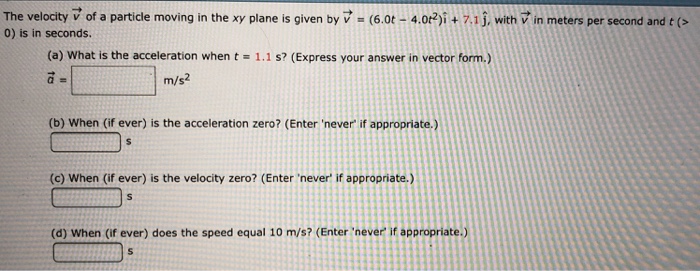The velocity v→ of a particle moving in the xy plane is given by v→ = (6.0t − 4.0t2)i^ + 7.1 j^, with v→ in meters per second and t( > 0) is in seconds. (a) What is the acceleration when t = 1.1 s? (Express your answer in vector form.) a→ = m/s2 (b) When (if ever) is the acceleration zero? (Enter 'never' if appropriate.) s (c) When (if ever) is the velocity zero? (Enter 'never' if appropriate.) s (d) When (if ever) does the speed equal 10 m/s ? (Enter 'never' if appropriate.) s
